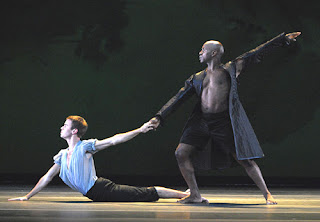Mark Morris' Mozart Dances

The great choreographer George Balanchine created only a handful of dances set to the music of Mozart. His reason for this was the excuse that Mozart's music is too perfect. And indeed it is. If one stops to listen to anything of Mozart's, from a chamber piece to a symphony, from an aria to a Mass, one will realize that Mozart is always dancing in his music. There is a lightness there, a celestial playfulness, that marks all of his work. As one very astute reader once commented on this blog:
When the angels play before the Throne of God, they play Bach, but when they play for their own pleasure, they play Mozart ... and God eavesdrops.
Mark Morris then, has tried to chase this divinely inspired sound with his new work, Mozart Dances, which received its West Coast premiere last week at Berkeley's Zellerbach Hall. While Morris is definitively one of the most prestigious choreographers working today, his newest work does not quite grasp the spirit of Mozart's music. This is by no means due to the fact that he is a bad choreographer or that he does not understand the dynamics of human movement. Many of the moments in his newest work were filled with elegance, grace, and style. At points he did meet Mozart's piano concerti and sonata right in the realm of Platonic Beauty.
Playfulness is indeed at the center of Mozart's music, but it is a very serious, very solemn playfulness. It is the playfulness of a traditional village feast, of a royal court, and of the most solemn liturgies of the great cathedrals. It is one that knows what it is but aspires to more. It knows its limitations yet continues to carry itself with much gravitas. It is like an altar boy dressed in an oversized cassock, fidgeting with the candle in his hands and trying not to giggle.
Morris' playfulness is far removed from this traditional world. Watching Morris is a bit like reading Jacques Derrida: you don't quite know what you're looking at. The godfather of deconstruction at times can write very serious passages analyzing the phenomenology of Edmund Husserl, and then right in the middle of it drop an untranslatable pun that would make a high school locker room blush. Derrida could be considered philosophy, literature, poetry, gossip column and social critique all at the same time, which is to say that he is in reality none of these things. In a universe where meaning is constantly being created and fluctuating, everything is possible, which ultimately means nothing of substance ever really exists. The last thing that one could do then is to take oneself seriously.
And that I believe is at least vaguely being hinted at in Morris' aesthetic, and I would not be the first in pointing this out. If there is a problem in his work, it is that there is too much that can be considered gratuitous. In one gag, the dancers formed two singal file lines, one male dancer being at the end of them. Then another male dancer runs through them and jumps into the male dancer's arms as if he were a child jumping into his father's arms. Everyone chuckled. It was genuinely funny. But what did it have to do with anything? What did the emergence of the women do in the second part of the piece; an emergence of about ten minutes that for me ruined the mood and balance of the dancing?
Like all postmodernists, Morris likes to subvert dichotomies. In the first portion of the three part work, only the women dance. As AG pointed out after the performance, there was barely any chemistry between them, not even of the camaraderie that can be found on the playground. This was be followed by the second portion, where the men carried each other, moved, and interacted in an almost sensual manner. (Indeed, the only notable pas de deux of the night took place between two of these gentleman.) Hanging around the artisitic community, one should expect this type of subversion of sexual mores. And I do, if it has a point. Morris' subversion, however, just made everything disjointed and out of place. By the time the women and men finally interacted at the end of the piece, the mood was already spoiled. The fact that he failed to "end with a bang" also did not help matters.
I may very well be in the minority in my observations. The house was at times roaring with approval. This of course is the Bay Area, and as many have observed, if Morris has a fundamentalist stronghold, it is definitely here. His kind of thinking is in line with the cafes filled on Sunday mornings with people chatting and reading the culture section of the San Francisco Chronicle. They are smart but not serious, cultured and wearing flip-flops, passionate about the important issues but not dogmatic. These people need entertainment too, and Morris shows them who they are in their deepest psyches. But even when his "number one fan" sitting next to me couldn't stop chuckling for half the piece at all of the choreograpic gags, one should really ask how much transcendent value this type of art really has.
I wouldn't be so harsh on Morris' new work if I didn't think it had potential. God knows that I have sat through much worse. That is why I am even taking the time to think about it: if it were complete garbage, I would just ignore it. As with all other examples of postmodern art, there is a fear of uniting, self-giving, and following through. There are elements of beauty, elements of passion, and longing for that which is beyond, but it never goes far enough. It is always disjointed, ephemeral, and unable to make an unabashed profession of faith in Beauty. Mozart's playfulness made him one of the greatest theologians of this Faith. Morris has a great deal of potential, if he would only say "yes" to the Beautiful, without gags or agendas.
















